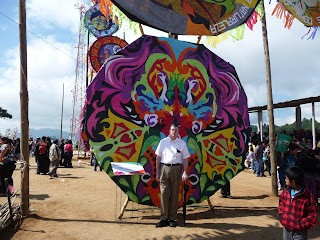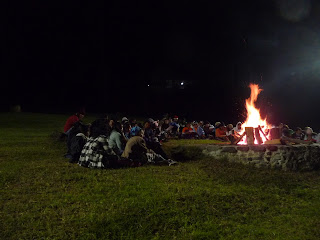Lest you think we are picking on Guatemala, I suspect that driving is much the same in most of Latin America and other developing areas. So what I describe here may apply in many parts of the world.
When a North American first sees traffic on the roads of Guatemala it probably looks like chaos. But we have found that there actually are rules – just different ones from what we are used to. And once you get used to them, it is not so bad and there may actually be some advantages.
There are two main factors that contribute to this automotive experience: (1) The way the roads are designed (or maybe not designed) and (2) the fact that there is virtually no law enforcement.
First the road system. If you have been to Salt Lake City and seen the wide, square roads laid out true to the compass, you will not see that here! Some of the roads are laid out close to compass directions but it appears to be pure chance when they are. Still, in most of the cities and towns, the roads do follow a grid pattern, just not a very careful one. Driving the side streets is not too challenging except for the prevalence of one-way roads without much apparent rhyme or reason as to why they go the way they do. Another challenge is that there are often no street signs identifying what street you are on or are approaching, and which cross streets are one-way. We often simply try to make a turn until we see that everyone is coming towards us!
The real challenge is on main thoroughfares. This country has an aversion to left turns. Not to say there aren’t any but they are so rare as to be a novelty when you do see one. You never realize what a great invention the left turn is until you don’t have them. Most of the main highways and boulevards are divided. Now imagine what happens if there is a divider in the center of the roadway and no left turns. That’s right – you can’t turn around! This is fine if you are just passing through, but if you are going shopping, for instance, even if the store is on the right side so it is easy to get to, you can’t get back home!
Now the problem is solved somewhat by providing an occasional turnaround. But they can be very scarce. We have found some roads where you literally have to go for miles before there is an opportunity to turn around. So we just don’t go shopping at those places because it is not worth the trip. I wish I could calculate the extra gas used and time wasted simply because you can’t turn around quickly.
Another challenge for the new arrival, which we all are at some point, is the lack of helpful signage. There are some signs, indicating, for example, “the airport is this way” but once you turn down that way, don’t expect any more help such as “arrivals over here”. Probably the most important intersection in the country, where the Pan American Highway crosses the road from Guatemala City to the coastal plain has absolutely no signs indicating where it goes or how you get there.
The Pan-American Highway, as it goes through Guatemala City, has an interesting challenge of unmarked exit only lanes. You can be driving along on what appears to be a normal through lane and suddenly you are on the other side of a divider taking you who knows where. They are hard to see coming because of the heavy traffic you are in. You have to learn these by trial and error.
So to get to someplace you have never been, studying a map ahead of time helps some, but you are almost surely going to miss some turns and get there by trial and error, simply because there are few clear markings of crossroads and no directional help getting around.
Now for the rules of the road: I’m sure somewhere there are lots of traffic laws carefully deliberated and written out by legislators, probably much like we find in the US. The Guatemalan police are simply not set up to enforce them so the drivers make up their own rules of the road. As long as you don’t hit anyone you have lots of leeway. For example, there is no speed enforcement, so you can drive as fast as you want! I like that when on the open highway. Here are some of the rules as we have learned from observation:
•
The bigger you are, the more right of way you have. At the top of the food chain are the trucks and buses; pedestrians are at the bottom. Here pedestrians have to learn to be very observant, light on their feet, and weave through traffic if there is no stop light.
•
Stop signs are treated like yield signs at home. If no one is coming, keep going or you may get rear-ended!
•
Turn signals are used by maybe 25% of drivers. The usual way you find out that the bus next to you wants your lane is when he starts driving into it.
•
Vehicle lights are optional. We have been out at night and have seen trucks, buses and motorcycles driving with no tail or brake lights. Especially fun after dark and in pouring rain. Of course there are no safety or emission inspections.
•
Speaking of emissions, all of the emissions saved in the US by spending billions of dollars on special equipment are probably totally offset by just the output of this country alone. Just think of all the old cars, trucks and buses that may have never seen a tuneup and are now in need of a ring and valve job. We always keep our A/C on recirculate so that the smoke doesn’t come into the car. Now multiply that by the rest of Latin America, Africa and Asia! You see why what North America and Europe do to curb emissions is not going to have any global effect as long as the rest of the world has no similar controls.
•
Motorcycles and scooters are all over the roads, swarming like flies, and apparently have only one rule – you can drive wherever you think the motorcycle will fit.
The net effect of all this is to create a driving environment that requires constant alertness (although we occasionally see people texting in traffic, usually going about 20 MPH slower than everyone else). In the US, we put up so many safeguards that it is easy to drive along, not paying a lot of attention to what others are doing. Not so here. As we first got into this driving environment we expected to see accidents every few blocks, but, interestingly, it seems that we see fewer accidents here than we did at home. I think the requirement for drivers to be alert may actually contribute to safer driving!
If you are the kind of driver that blows a gasket when you get cut off, don’t bother driving here. This is a libertarian driving environment where it’s every man for himself. If you let 20 feet open up between you and the car in front, someone next to you will probably want to fill that space. There is no point getting angry at other drivers or you will be angry all the time. Just realize that you have to be assertive like they are and go out and fight for that patch of road in front of you. After a while you learn the game and find that it’s not so bad. I just dread the day when I have to try to adjust to US driving rules again!










































